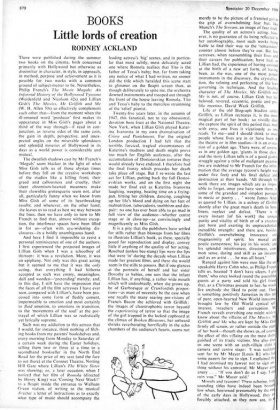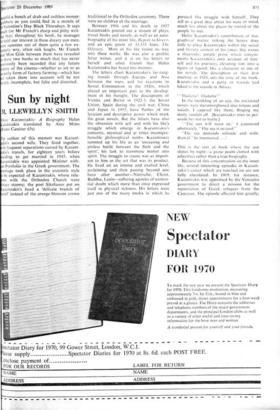BOOKS Little lords of creation
RODNEY ACKLAND
There were published during the summer two books on the cinema, both concerned primarily with Hollywood but otherwise as dissimiliar in character, in style, in approach, in method, purpose and achievement as it is possible for two works with a common ground of subject-matter to be. Nevertheless, Philip French's The Movie Moguls: An Informal History of the Hollywood Tycoons (Weidenfeld and Nicolson 42s) and Lillian Gish's The Movies, Mr Griffith and Me (W. H. Allen 50s) so effectively complement each other that—from the moment when the ill-omened word 'producer' first makes its appearance in Miss Gish's pages about a third of the way through—if read in con- junction, as reverse sides of the same coin, the gain in depth, perspective, and unex- pected angles on the miserable splendours and splendid miseries of Hollywood in its days as a world power is considerable and mutua:.
The dwarfish shadows cast by Mr French's 'Moguls' seem blacker in the light of what Miss Gish tells us of those elysian times before they fell on the creative workshops of the studios like a killing frost; their greed and callousness and cruelty, their sheer chromium-hearted meanness make their clownlike grotesquerie seem not, after all, particularly funny when we know from Miss Gish of some of its heartbreaking results; and whenever, on the other hand, the leaves us to read as best we may between the lines, then we have only to turn to Mr French to find that, almost without excep- tion, the interlinear spaces have been filled in for us—often with eye-widening dis- closures—in a boldly unambiguous hand.
And here I find it impossible to resist a personal reminiscence of one of the authors. I first experienced the projected images of Lillian Gish when I was a schoolboy of thirteen: it Vas a revelation. More, it was an epiphany. Not only was this great acting but it seemed to me that it was the only acting, that everything I had hitherto accepted as such was empty, meaningless, dull and wooden—'pretending' merely; and, to this day, I still have the impression that the faces of all the film actresses I have ever seen, compared with Lillian's, have been pro- cessed into some form of fleshly cement, impermeable to emotion and most certainly to fluid emotion, to emotions in transition, to the 'movements of the soul' at the por- trayal of which Lillian was so realistically yet lyrically supreme.
Such was my addiction to this actress that I would, for instance, think nothing of filch- ing books from my parents' bookshelves and, every morning from Monday to Saturday of a certain week during the Easter holidays, selling them two or three at a time to a secondhand bookseller in the North End Road for the price of my seat (and the fare to get there) at the Coronet Theatre, Notting Hill Gate where Lillian's The White Sister was showing; or, a later occasion, when I noticed that her film of Romola (directed by Henry King) was 'Coming Next Week!' to a fleapit inside the entrance to Walham Green station, of writing to the musical director a letter of instructions as to exactly what type of music should accompany the
leading actress's 'big' scenes, and in particu- lar that most subtly, most delicately acted one where Romola realises that Tito is the father of Tessa's baby; but, far from taking any notice of what I had written, no sooner did the title which heralded this scene start to glimmer on the fleapit screen than, as though deliberately to spite me, the orchestra downed instruments and trooped out through the front of the house leaving Romola, Tito and Tessa's baby to the merciless strumming of the 'relief' pianist.
Twenty-five years later, in the autumn of 1947, this fanatical, not to say obsessional, devotion bore fruit at the National Theatre, New York, when Lillian Gish played Kater- ina Ivanovna in my own dramatisation of Crime and Punishment. For the original London production I had felt that the terrible, farcical, tragical circumstances of Katerina's madness and death might prove too much for English audiences, after the accumulation of Dostoievskian tortures they would already have endured. [therefore had the final frenzy which precedes her death take place off stage. But I re-wrote the last act for Lillian, putting back the full Dostoi- evskian works, and on the first night she made her final exit as Katerina Ivanovna laughing, weeping, beating time on a frying- pan, hitting her children, dancing, coughing up her life's blood and dying on her feet of malnutrition, tuberculosis, snobbism and des- pair: no one has ever been able to go mad in full view of the audience—whether centre stage or in close-up—as convincingly and magnificently as Miss Gish.
ft is a pity that the publishers have settled for stills rather than blowups from her films to illustrate Lillian's book, as these, specially posed for reproduction and display, convey little if anything of the quality of her acting. Rpsebud (unless bee-stung) lips were the lips that were 'in' during the decade when Lillian made her greatest films, and these she would seem in the stills to possess. But if one glances at the portraits of herself and her sister Dorothy as babies, one sees that the infant Lillian has, if anything, a rather wide mouth which will undoubtedly, when she grows up, be of Garboesque or Crawfordish propor- tions—as must of necessity be the case when one recalls the many searing pre-visions of Francis Bacon she achieved with Griffith: the images of claustrophobic terror beyond the experiencing of terror so that the image of the girl trapped in the locked cupboard at the climax of Broken Blossoms, her unheard shrieks reverberating horrifically in the echo chambers of the audience's hearts, seems not merely to be the picture of a frenzied girl in the grip of overwhelming fear but, like Munch's The Scream, an image of fear itself.
The quality of an actress's acting, how. ever, is no guarantee of its being reflected in her autobiography, most such works being liable to find their way to the 'remainders' counter almost before they're out. But few actresses, when reassembling their lives and their careers for publication, have had. as Lillian had, the experience of having assisted at the birth of a new art form, of having been, as she was, one of the most potent instruments in the discovery, the crystallisa- tion, the refining and perfecting of the laws governing its technique. And the leading character of The Movies, Mr Griffith and Me is not, of course, Lillian Gish but her beloved, revered, eccentric, poetic and pro. lific maestro. David Wark Griffith.
Life at the old Biograph Studios under Griffith, as Lillian recreates it, is the most magical part of her book : so vividly does she capture the spirit of this period that, mad with envy, one lives it vicariously as one reads. To me—and I should think to most people whose lives are in or have been in the theatre or in film studios—it is an evoca. tion of a golden age. There were, of course. as in any golden age, 'giants in those das. and the story Lillian tells is of a good giant's struggle against a tribe of malignant pygmies (we are indebted to Mr French for the infor- mation that the average tycoon's height was under five feet) and his final defeat and destruction at their hands. 'All through his work there are images which are as impos- sible to forget, once you have seen them, as some of the grandest and simplest passages in music or poetry . . ' wrote James Aeee. as quoted by Lillian, in a eulogy of Griffith shortly after the great man's death in lone- liness, neglect and defeat. 'There is in every instant [of his work] the unique purity and vitality of birth or of a creature just born and exerting its unprecedented. incredible strength: and there are, besides. Griffith's overwhelming innocence and magnanimity of spirit; his moral and poetic earnestness; his joy in his work; and his splendid intuitiveness, directness, com- mon sense, daring and skill as an invento and as an artist . . . he was all heart.'
Ranged against him were men like the un speakable Harry Cohn who. as Philip French tells us. boasted 'I don't have ulcers. I give them,' who once looked round the assembled guests at a party and told his girl friend that, as a Christmas present to her, he would fire anybody she liked to point out. There is something positively Jamesian in this tale of pure. open-hearted New World innocence brought low by Old World cynical self- interest, treachery and corruption. Mr French reveals everything one might wish 10 know about the villains of The Movies. Alt Griffith and Me who are kept by Miss Gish firmly off screen, or rather outside the lino of her book—thoueh she shows us, of course. the effect of this villainy on the most distil). guished of its tragic victims. She also eiva us one scene with an arch-villain right camera and centre stage: 'I was suddenle sent for by Mr Mayer [Louis B.] who ha some pavers for me to sign. I explained tha I had promised my lawyer not to sign anv thing without his apnroval. Mr Mayer are angry . . . "If you don't do as I say. I clit ruin you." Mr Mayer said.'
Mom& and tycoons! These echoine. hie sounding titles have indeed been broue
low when, borrowed presumably by the PR of the early days in Hollywood, they 3 forcibly attached, as they now are, to
ualid a bunch of drab and ruthless money- bbers as you could, find in a month of Valentine's Day Black Thursdays. It says
itch for Mr French's sharp and pithy writ- that, throughout his book, he manages hold our interest in these dreary con men, en squeezes out of them quite a few ex- mely wry, often- sick laughs. Mr French d Miss Gish between them have revealed these two books so much that has never viously been recorded that any future story of the cinema—whether as art or as early form of factory farming—which has t taken them into account will be not erely incomplete, but false and distorted.



































 Previous page
Previous page